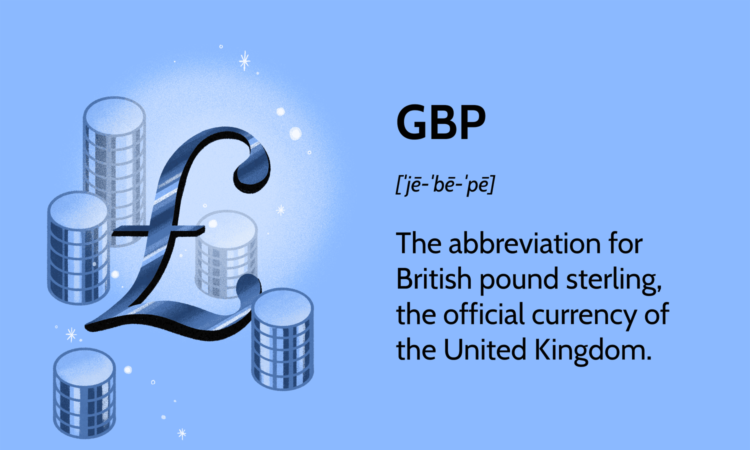
What Is the GBP?
GBP is the abbreviation for the British pound sterling, the official currency of the United Kingdom, the British Overseas Territories of South Georgia, the South Sandwich Islands, and British Antarctic Territory and the U.K. crown dependencies, the Isle of Man and the Channel Islands.
The British pound sterling is symbolized by the pound sign (£) and is sometimes referred to as “sterling” or by the nickname “quid.”
Key Takeaways
- GBP is the abbreviation for the British pound sterling, the official currency of the United Kingdom.
- The British pound sterling is symbolized by the pound sign (£) and referred to as “sterling” or by the nickname “quid.”
- The most common trading pairs involving the British pound are the euro (EUR/GBP) and the U.S. dollar (GBP/USD).
Trading the GBP
The British pound competes with the U.S. dollar (USD), euro (EUR), and Japanese yen (JPY) in daily volume trading. The most common currency pairs involving the British pound are the euro (EUR/GBP) and the U.S. dollar (GBP/USD). GBP/USD is referred to as cable by foreign exchange traders.
The penny sterling or pence is 1/100th of a pound. Many stocks are traded in pence rather than in pounds. Stock exchanges may use GBX to indicate pence. Though the official name of GBP is pound sterling, “sterling” or STG may be used more commonly in accounting or foreign exchange (forex) settings.
Currencies pegged to the British pound include the Falkland Islands pound, Gibraltar pound, Saint Helena pound, Jersey pound (JEP), Guernsey pound (GGP), Manx pound, Scotland notes, and Northern Ireland notes.
The GBP, or British pound sterling, is the oldest active legal tender in the world.
History of the GBP
The British pound became the official currency of the United Kingdom when England and Scotland united to form a single country in 1707, but the pound was used as a form of money in the year 760. Until 1855, when printing began, the Bank of England wrote all banknotes by hand.
The British pound served as currency in the colonies of the British Empire, including Australia, New Zealand, and Canada. In the late 19th and early 20th centuries, many countries tied the value of their currencies to the price of gold. The gold standard offered a uniform way to determine value among world currencies. Before World War I, the United Kingdom used the gold standard to set the value of the British pound.
At the outbreak of World War I, the country abandoned the gold standard, then reinstated it in post-war 1925, only to abandon it again during the Great Depression. In 1971, the United Kingdom allowed the British pound to float freely, allowing market forces to determine its value. In 2002, when the euro became the common currency of most European Union (EU) member nations, the U.K. kept the GBP as its official currency. This turned out to be a good decision for the U.K., as it officially left the EU in 2020.
Legislation and the GBP
In a June 2016 referendum, British voters supported a measure to leave the European Union through a process called Brexit. The GBP declined significantly upon the U.K.’s split from the EU, and the value fluctuated in response to trade negotiations.
The pound sterling declined again in Sept. 2022 after Prime Minister Liz Truss announced economic policies on tax cuts. Although the Truss government aimed to boost U.K. economic productivity, investors and forex traders were concerned that tax cuts would increase already-high inflation and debt. The GBP/USD sank to an all-time low of 1.03 on Sept. 26, 2022.
Is British Pound and Sterling the Same?
Yes. The official name of the U.K. currency is pound sterling, but it is often called the British pound or sterling.
Why Is the British Pound Called Sterling?
Reportedly, the U.K.’s currency evolved from sterling silver pennies that were used in the late 700’s.
Why Are Pounds Called Quid?
There doesn’t seem to be a definitive answer, similar to the dollar being referred to as “buck.” Some believe it originates from quid pro quo, Latin for “something for something,” while others think it came from Quidhampton, where there was once a royal paper mill.
The Bottom Line
The GBP, or British pound sterling, is the official currency of the United Kingdom. The GBP is the oldest currency in the world that is still used as legal tender. Symbolized by the pound sign (£), the GBP has one of the highest trading volumes in the world.


